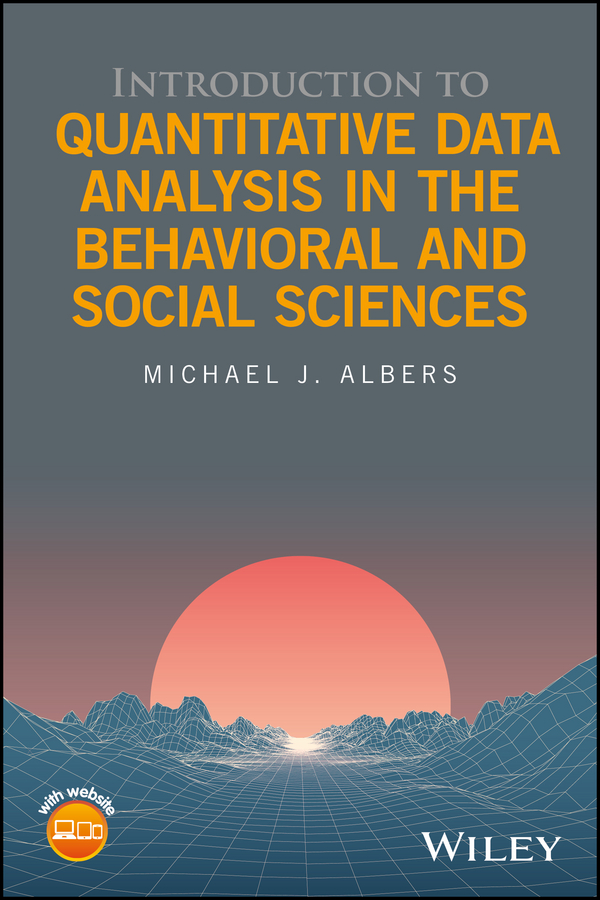Электронная книга: Michael Albers J. «Introduction to Quantitative Data Analysis in the Behavioral and Social Sciences»

|
Guides readers through the quantitative data analysis process including contextualizing data within a research situation, connecting data to the appropriate statistical tests, and drawing valid conclusions Introduction to Quantitative Data Analysis in the Behavioral and Social Sciences presents a clear and accessible introduction to the basics of quantitative data analysis and focuses on how to use statistical tests as a key tool for analyzing research data. The book presents the entire data analysis process as a cyclical, multiphase process and addresses the processes of exploratory analysis, decision-making for performing parametric or nonparametric analysis, and practical significance determination. In addition, the author details how data analysis is used to reveal the underlying patterns and relationships between the variables and connects those trends to the data’s contextual situation. Filling the gap in quantitative data analysis literature, this book teaches the methods and thought processes behind data analysis, rather than how to perform the study itself or how to perform individual statistical tests. With a clear and conversational style, readers are provided with a better understanding of the overall structure and methodology behind performing a data analysis as well as the needed techniques to make informed, meaningful decisions during data analysis. The book features numerous data analysis examples in order to emphasize the decision and thought processes that are best followed, and self-contained sections throughout separate the statistical data analysis from the detailed discussion of the concepts allowing readers to reference a specific section of the book for immediate solutions to problems and/or applications. Introduction to Quantitative Data Analysis in the Behavioral and Social Sciences also features coverage of the following: • The overall methodology and research mind-set for how to approach quantitative data analysis and how to use statistics tests as part of research data analysis • A comprehensive understanding of the data, its connection to a research situation, and the most appropriate statistical tests for the data • Numerous data analysis problems and worked-out examples to illustrate the decision and thought processes that reveal underlying patterns and trends • Detailed examples of the main concepts to aid readers in gaining the needed skills to perform a full analysis of research problems • A conversational tone to effectively introduce readers to the basics of how to perform data analysis as well as make meaningful decisions during data analysis Introduction to Quantitative Data Analysisin the Behavioral and Social Sciences is an ideal textbook for upper-undergraduate and graduate-level research method courses in the behavioral and social sciences, statistics, and engineering. This book is also an appropriate reference for practitioners who require a review of quantitative research methods. Michael J. Albers, Ph.D., is Professor in the Department of English at East Carolina University. His research interests include information design with a focus on answering real-world questions, the presentation of complex information, and human–information interaction. Dr. Albers received his Ph.D. in Technical Communication and Rhetoric from Texas Tech University. Издательство: "John Wiley&Sons Limited"
ISBN: 9781119290216 электронная книга Купить за 6945.83 руб и скачать на Litres |
Другие книги схожей тематики:
| Автор | Книга | Описание | Год | Цена | Тип книги |
|---|---|---|---|---|---|
| Daniel Denis J. | Applied Univariate, Bivariate, and Multivariate Statistics | A clear and efficient balance between theory and application of statistical modeling techniques in the social and behavioral sciences Written as a general and accessible introduction, Applied… — John Wiley&Sons Limited, электронная книга Подробнее... | 10038.89 | электронная книга |
См. также в других словарях:
Social sciences — The social sciences comprise academic disciplines concerned with the study of the social life of human groups and individuals including anthropology, communication studies, criminology, economics, geography, history, political science, psychology … Wikipedia
social science — social scientist. 1. the study of society and social behavior. 2. a science or field of study, as history, economics, etc., dealing with an aspect of society or forms of social activity. [1775 85] * * * Any discipline or branch of science that… … Universalium
Data mining — Not to be confused with analytics, information extraction, or data analysis. Data mining (the analysis step of the knowledge discovery in databases process,[1] or KDD), a relatively young and interdisciplinary field of computer science[2][3] is… … Wikipedia
Quantitative history — is an approach to historical research that makes use of quantitative, statistical and computer tools. It is considered a branch of social science history and has favorite journals, such as Historical Methods, Social Science History, the Journal… … Wikipedia
Behavioral economics — and its related area of study, behavioral finance, use social, cognitive and emotional factors in understanding the economic decisions of individuals and institutions performing economic functions, including consumers, borrowers and investors,… … Wikipedia
Psychology (The separation of) from philosophy — The separation of psychology from philosophy Studies in the sciences of mind 1815–1879 Edward S.Reed THE IMPOSSIBLE SCIENCE Traditional metaphysics The consensus of European opinion during and immediately after the Napoleonic era was that… … History of philosophy
